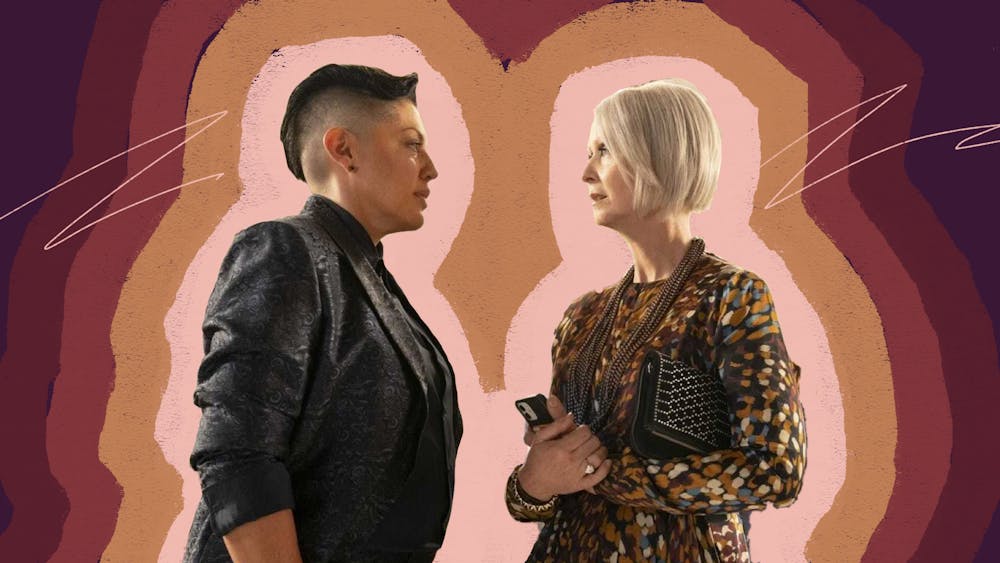I’m Sorry.
I Can’t.
But Che Diaz was an excellent addition to And Just Like That...
Don’t get me wrong—Che Diaz is awful. As a podcaster and stand–up comedian, they're selfish, narcissistic, and most importantly, not funny. Their fictional “comedy concert” was just woke jokes that fell flat. Every. Single. Time.
HBO Max's limited original series And Just Like That… picks up 20 years after the landmark Sex and the City, with the characters navigating life and friendships in their fifties. And while Che Diaz might suck, the creative decision to introduce such a controversial character in And Just Like That… has its merits.
Diaz brings the chaotic and wild energy that would’ve otherwise been missing from the show due to the absence of Samantha Jones, after actress Kim Cattrall declined to join the revival. It was Samantha who put the “sex” in the city, and now the mantle has been passed to the one and only “Hey it’s Che Diaz.”
For one thing, Che Diaz provides some much needed representation and diversity to the And Just Like That… cast. As a queer, nonbinary, and Irish–Mexican comedian, Che is a welcome addition to a show that, in its past iterations, failed to represent anyone who wasn’t rich (Carrie writes one column a week and lives in a million–dollar brownstone apartment) or white.
“I’m really proud of the representation that we’ve created. We have built a character who is a human being, who is imperfect, who’s complex, who is not here to be liked, who’s not here for anybody’s approval. They’re here to be themselves,” Sara Ramirez—who plays Che Diaz—says in a New York Times interview.
It's understandable that many critics of Che Diaz see them as a caricature of a nonbinary person, rather than a nuanced individual whom the audience can relate to and root for. You could look at Che’s “X, Y, and Me” podcast with its “woke moment” button or their comedy special that hinges on their nonbinary experience and see Che as an amalgamation of nonbinary stereotypes instead of a developed character.
Nevertheless, there’s no denying that they've done the nearly impossible, for a show that premiered in 1998, of keeping it a cultural phenomenon. Whether you hate or love Che, you’re talking about them, and Sex and the City has always been a driving force behind pop culture discourse. Among all the things Che has done in their short time in the Sex and the City universe, none have been more dissected and criticized than their budding relationship with New York’s favorite cynic: Miranda Hobbes.
Che changes everything about the Miranda viewers had come to know: faithful, confident, and career–oriented. It’s with Che that Miranda has her queer sexual awakening, which disrupts her mundane yet stable marriage with partner Steve Brady. Sex and the City addressed Miranda’s sexuality a few times before, including a storyline where she is set up on a blind date with another woman and confirms that she’s “yep, definitely straight.” AJLT rectifies SATC’s limited exploration of sexuality, more than two decades later, by presenting Miranda’s sexual identity as fluid. While Che and Miranda’s hookup in Carrie’s kitchen might be a tad horrifying to watch, especially as Carrie is awake and mere meters away, it frees the show and lets Miranda and Che explore a relationship unlike any other in SATC’s history.
Even the creators of And Just Like That… have acknowledged that Che is the catalyst to Miranda’s life upheaval. “Miranda is making choices to be Miranda, and Che is a conduit to that, and making Che not perfect highlights that,” co–executive producer Rachna Fruchbom tells Vulture. “Che is not the perfect solution, but the representation is that Miranda is embracing chaotic change.”
Cheating on your partner might be immoral—even hypocritical in Miranda’s case, as she practically crucified Steve in Sex and the City for doing the exact same thing—but Che’s introduction into Miranda’s life lets her become the semi–replacement of Samantha and the sexually adventurous one of the trio.
For most of Sex and the City, the four female leads were single. The appeal of the show lay in watching these women navigate the tricky streets of New York through friendship, fashion, and of course, sex. The reboot brings back this sense of unpredictability; Mr. Big’s infamous Peloton death opens the door for Carrie to be single again and the introduction of Che lets Miranda explore an open and undefined relationship. With the exception of Charlotte, who’s always been the most monogamy–focused, the main characters are single again and free to explore sex and friendships on their own terms.
Sure, Miranda and Che’s relationship is messy, but that’s what makes it fun. If someone wanted to watch another show about middle–aged people dealing with traditional married life, they could just turn on Modern Family or This Is Us. What else was Miranda going to do, just splurge on sundaes and watch prestige TV with Steve every evening? Having Miranda lose her moral compass is more interesting, and resembles much of the original show’s sexually liberating storylines.
The spirit of SATC has always revolved around the single life and the freedoms it carries, so if this revival was ever going to be faithful to the original, it had to take some wild risks and have the characters back out dating, which is what led to the stroke of brilliance that is Che Diaz.
Che Diaz is nowhere close to perfect. But for a show nearly doomed from its beginning with Samantha out of the picture, Che brings back the bold attitude, fierce independence, and unforgettable moments that made the original series so riveting to watch.







